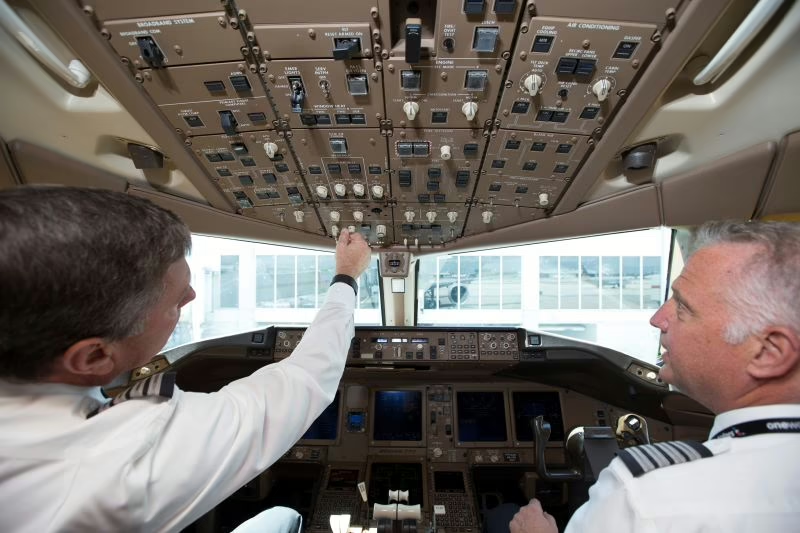
Voting campaigns for new pilot collective bargaining agreements (CBA) are beginning to gain momentum at Delta Air Lines and Hawaiian Airlines.
American Airlines and United Airlines are next, but all parties are bracing for increasingly bumpy labor talks.
On Jan. 18, the Delta Master Executive Council (MEC), represented by the Air Line Pilots Association, Int’l (ALPA), voted to send a new tentative agreement (TA)—Contract 2019—to Delta’s 15,000 pilots for ratification. Fourteen voted in favor and three against. Balloting for the new pilot working agreement (PWA) to be ratified opens Jan. 31 and closes March 1. The MEC is conducting a series of road shows at seven Delta bases beginning Jan. 23 in Salt Lake City.
The contract calls for baseline composite hourly pay increases of 18% retroactive to Jan. 1, 2023, with built in increases of 5%, 4%, and 5% on Jan. 1 of 2024, 2025, and 2026, respectively. Under terms of the new PWA, pilots will receive a one-time payment based on eligible earnings of 4% in calendar year (CY) CY2020, 4% of CY2021, and 14% of CY2022.
“I appreciate the magnitude of the decision facing each Delta pilot,” Delta Master Executive Council Darren Hartmann Chairman said in a letter to membership.
“While the Contract 2019 TA vote was not unanimous, a majority of the MEC believe the agreements contain significant value for the Delta pilots across-the-board. Delta is poised to be an industry-leader this year and the new PWA, if ratified, will be industry-leading,” Negotiations for Contract 2019 first commenced prior to the pandemic in April 2019. The talks eventually wound up in mediation in February 2020 but were put on hiatus due to the coronavirus pandemic. Talks for the new CBA resumed in January 2022.
Simultaneously, Delta’s MEC also voted to recommend a separate standalone clause letter of agreement on international “Global Scope” clause job protections to be put up for ratification. This covers Delta pilot flying “relating to profit/loss sharing agreements, equity investments, codeshare partners, interline agreement subsidiaries, fee-for-departure regional carriers, and affiliated operators.” With Delta’s ambitious joint ventures, alliances, and equity investments in foreign-domiciled carriers, this issue has gained even more traction for the attention of the union and its membership.
Hawaiian Airlines pilots are also considering a new four-year TA for its 1,000 pilots, with two weeks of voting set to begin Jan. 27. If ratified, what its MEC calls “an industry standard agreement” would take effect March 2. The agreement stipulates an average 32.9% pay increase plus a signing bonus, increased company retirement contributions, and quality of life enhancements. The union secured rates for Hawaiian’s future fleet of Airbus A330 freighters operating under the Amazon contract, that it termed “the highest in the industry, surpassing existing rates at cargo giants UPS and FedEx Express.”
“Hard-fought negotiations between the Negotiating Committee and the company have now yielded what the MEC believes to be an agreement that accomplishes the goals our pilots set for us when we opened talks two years ago,” Hawaiian ALPA Master Executive Council (MEC) Chair Larry Payne said.
Contract Envy
The Delta agreement and strong earnings reports have added fuel to the fiery negotiations at Delta and Hawaiian’s two other U.S. legacy carrier peers. Hundreds of United Airlines pilots picketed at San Francisco International Airport (SFO) on Jan. 18 displaying their frustration with negotiations as United announced $843 million in fourth quarter net income.
Following United’s strong earnings results, acting United MEC chairman Capt. Mike Harrison said, “We are aware of management’s public comments about the impact of the Delta AIP, now a Tentative Agreement, and that they roughly know what a deal will look like. The company has said that there is no reason this new contract cannot be finished in a couple of weeks. The United MEC will send an industry-leading proposal that includes the concerns of our members and reflects the contract hard-working pilots of United Airlines deserve.”
American Airlines’ 15,000 Allied Pilots Association (APA)-represented pilots are in their fourth year of contract negotiations. Following better than expected earnings, American’s pilots leverage is only expected to increase. On Dec. 8, 2022, American’s APA board said, “American Airlines management has consistently shown an unwillingness to lead the industry, and ultimately an unwillingness to invest in one of their most important assets—our pilot group ... Delta Air Lines management has demonstrated a visionary understanding of the current state of the marketplace for professional pilots. Working with the Delta ALPA MEC, they have ushered in a new standard for pay, benefits, and work rules befitting of the pilots of the world’s safest and largest airlines.”
In an emailed statement on Jan. 20, American’s APA board said, “our Board of Directors and Negotiating Committee will meet next week to review the details of the tentative agreement approved by the Delta ALPA Master Executive Council.”
APA is also alleging American is now four weeks late in paying holiday premium pay over Thanksgiving. “It also appears they haven’t gotten their act together in time to properly account for Christmas and New Year’s,” said the APA’s Jan. 13th News Digest.
Spirit Airlines’ ALPA pilots voted Jan. 10 to ratify a new two-year TA representing an average 27% increase over the next two years, with zero concessions. Alaska’ Airlines’ ALPA-represented pilots secured a new three-year contract back in October 2022.
On Jan. 18, Southwest Airlines’ pilot union SWAPA issued a call for a Strike Authorization Vote from the membership. “This historic action on the part of the pilot union comes in the wake of Southwest’s largest meltdown and the utter lack of meaningful progress on a contract negotiation,” said SWAPA chairman Captain Casey Murray in a statement. “It was the lack of discussion or commitment by our leadership team to rectify these issues for our passengers and our pilots that drove us to make the decision to carry forward on this path,” Murray added.
The vote will take place beginning on May 1 and will ultimately give the pilots the ability to strike once released under the Railway Labor Act.
In an effort to appease its pilots, the hobbled carrier on Jan. 20 announced it is giving what it is calling “gratitude pay”—bonuses to several workgroups affected by the meltdown, including the 10,000 strong pilot group. They will receive approximately $45 million in additional compensation equaling nearly $4,500 per pilot, on top of extra pay that was already awarded over the holidays. SWAPA voted to accept the pay bonus on Jan. 19. The bonuses should appear in Southwest employees’ paychecks starting in late February.
“We implemented gratitude pay for several workgroups during the operational disruptions in December and that ran through early January as SWAPA noted,” Southwest said in comments provided to Aviation Daily. “Salaries, wages and benefits expenses are recognized in the period incurred; therefore, we would have included our estimate for all gratitude pay through Dec. 31 in our financial impact estimate provided in our 8-K filing on Jan. 6. We will cover this in more detail as part of our upcoming financial results release and call on Jan. 26.”
